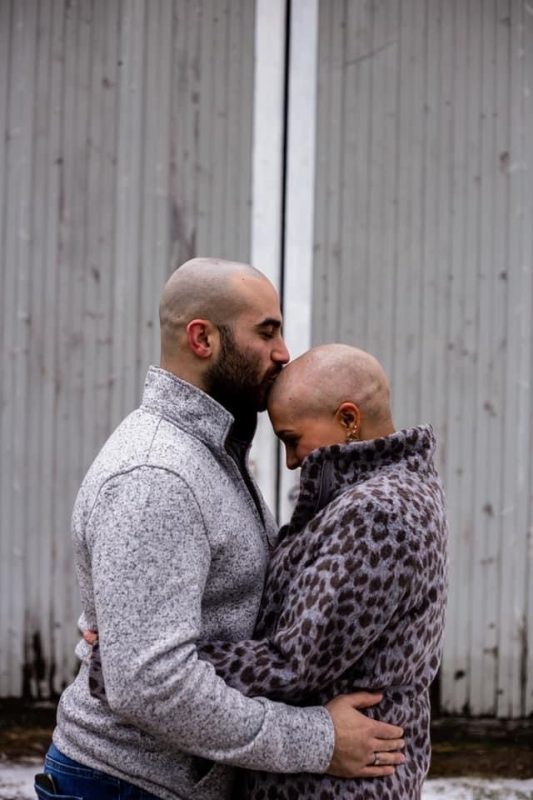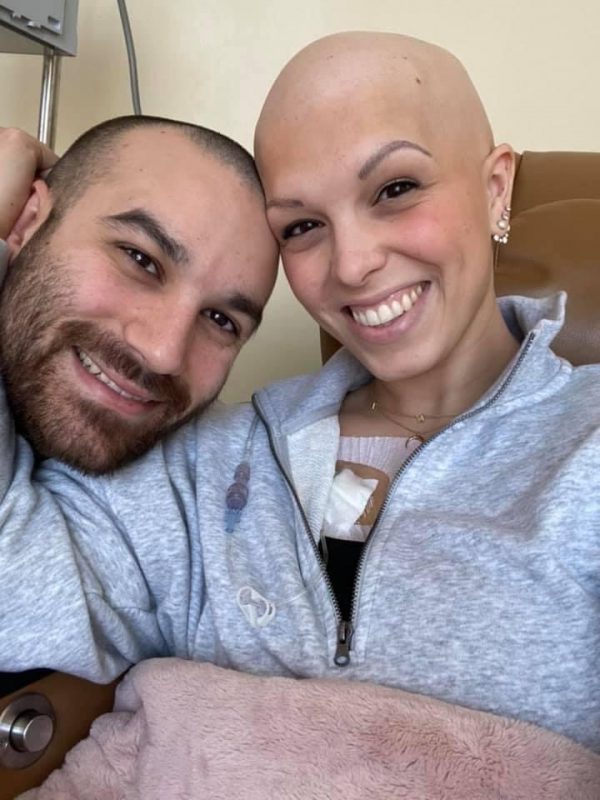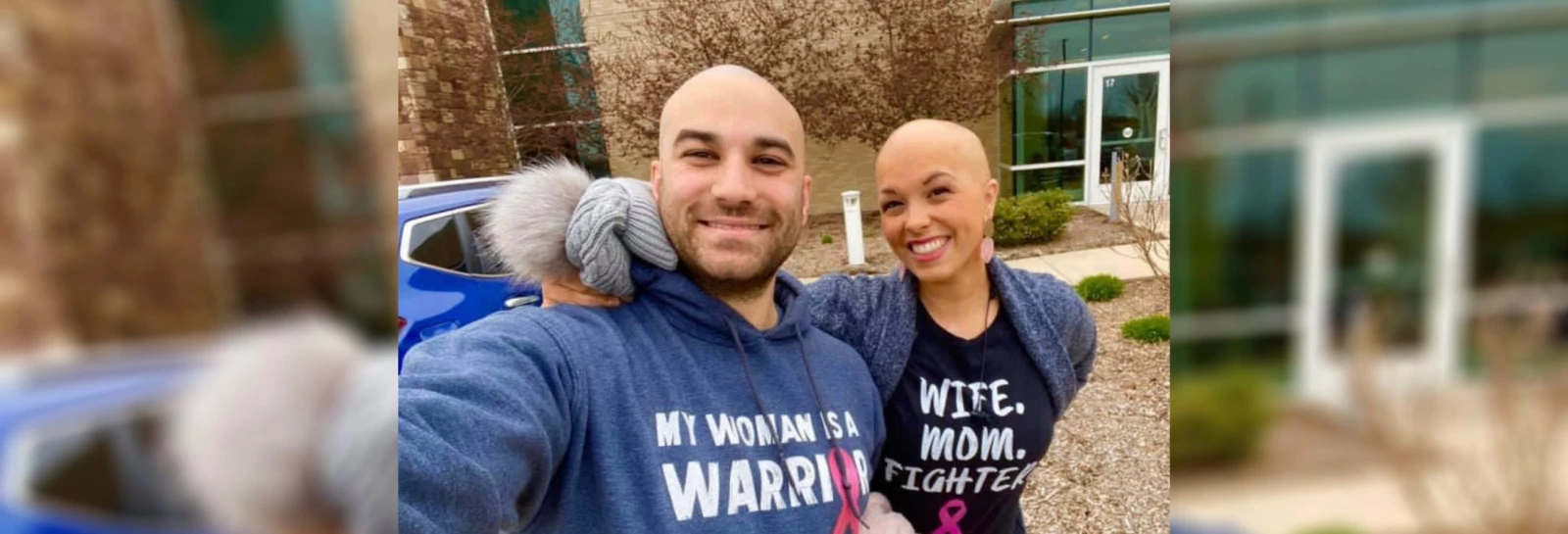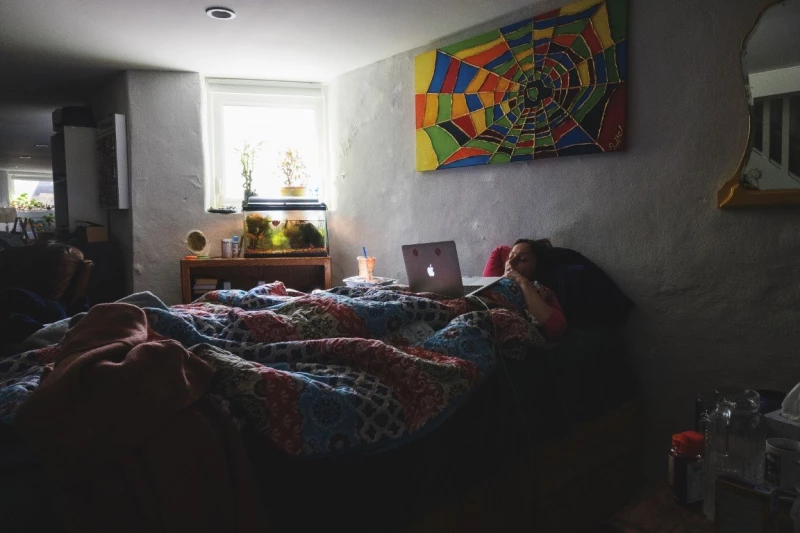Just For Co-Survivors: When Breast Cancer Comes For The One You Love
By Travis Lindley
At 28 years old, I stood there in a dark room, watching as my wife had her breast examined by an ultrasound technician. I saw the look on his face when he found what we all hoped didn’t exist.
I’ll never forget his next words. “I’m technically not allowed to tell you this, it still needs to be read by a radiologist, but I will tell you, your life is about to change. It will be very hard, and you both need to prepare to receive some bad news. This is breast cancer.”
I think most people would have been optimistic and hoped that he didn’t really know what he was talking about since he wasn’t qualified to really “read” the report. But that isn’t how I took it. I saw a man that was so confident in what he saw that he was willing to “break the rules” to give us a heads up, and for that I am forever grateful.
We left that appointment, went to 5 Guys for lunch and made the dreaded phone call to her parents. I had the task of explaining to my in-laws that their daughter had just been told she has cancer and what I was going to do, as her husband, to prevent it from taking her life. That’s a tall order.
As you know, if you’re a co-survivor like me, there really is nothing, practically, you can do.

After getting off the phone with her parents, I held her hand and promised her that she would not experience a single chemo treatment alone.
After wasting precious time with dismissive doctors and being misdiagnosed 4 times, finally we sat in an oncologist’s office where we were told she had gone from stage 1 to stage 3C in the span of a month.
She was “fast tracked” into getting chemo as soon as possible. I tried to maintain optimism throughout the treatments, and to be honest, I think I did a pretty good job. She never saw me shed a tear or break down, at least not that I know of.
But after I heard and had time to let reality sink in, I broke down. I think a lot of co-survivors probably do.
You think of all the wonderful times you’ve had with your person. If it’s your spouse and you’re a parent, you think of how you’re going to explain to your child or children that mommy has a deadly disease and may be getting ready to go meet Jesus soon. You try to figure out the logistics of being a single parent. You say goodbye to the hope of ever having more children.
WHEN IT GETS HEAVY
I want to discuss the worry and dread that comes along with the diagnosis. These are very strong emotions. They affect us physically, cause us to: do things, think things and say things that many people would not understand.
For me, my mind became my enemy. I’m no psychologist or anything, but I think my mind was trying to protect my heart from the pain of losing my wife. I felt like my mind just closed off.
I felt the pain of her loss, but at the same time she was still around. I don’t know if that even makes sense, but that’s truly how I felt. So I eventually learned that I needed to keep reminding myself that my mind was wrong. I was subconsciously lying to myself. She wasn’t gone. I was still helping her, taking her to all her appointments, making sure she kept up on her meds, doing all the things we co-survivors do.
Eventually, she also no longer felt like my wife. She felt like my patient. In my effort to keep my wife alive, I turned into a caretaker, and solely a caretaker. This was an awful thing to do. DON’T DO THIS!!!
Be careful, because it sneaks up on you, and you won’t realize it’s happened until you’re on the other side of it all. To this day, Debi still tells me that the worst part of her cancer journey was me treating her like a patient instead of a wife. Those words are like a dagger to the heart, but the truth hurts. I am glad to say that with her help, I have outgrown that role and do much better with her now. But new co-survivors definitely need to be warned. Don’t trade in your current role in the life of your survivor to be a caretaker. You can do both!
I also want to advise you to be kind to yourself. It’s easy for us to blame ourselves. Debi had no history of breast cancer in her family. She did the genetic tests and she carries none of the known breast cancer genes.
Her doctors told her that they believe she developed cancer due to an imbalance in hormones due to the many failed pregnancies she’s had over the years. We had 4 miscarriages in 3 years. When Debi and I met, I told her I wanted 3 kids, but she wanted none. After being married for a while, we compromised and decided we’d be happy with 2. We had our first son in 2016 and shortly thereafter began trying for our second.
When they told us that was the reason she probably developed breast cancer, my heart was dripping with guilt. Had I just been happy with the one, or just been happy not having children at all, maybe we wouldn’t have gone through cancer during a pandemic.
Now that I think about it, I lied to you earlier. I did break down in front of her once. I think we were at a Wendy’s. There she cornered me. She had been watching me live life, getting more and more depressed. Finally, she had enough, and she asked me how I was feeling about her cancer diagnosis.
This was the first time anyone had asked me how I felt about anything we were going through. Everyone’s concern was for Debi, as it should be. Not even I had been concerned about how the diagnosis had been on myself!
I broke down in front of her at the restaurant, and I mean in an ugly fashion, as I poured out to her how it was my fault that she developed cancer. How I felt as though I had pushed her into pregnancy after pregnancy, trying to live this perfect little life. This time, she took care of me, talked me down off the ledge, per se.
I share all that to say this: Cancer sucks. Cancer is no one’s fault. Even if you don’t feel as I did, where you “caused the cancer” sometimes we tend to self-destruct in other ways. Maybe your guilt is that you feel like you could have done a better job caring for your survivor. Maybe it’s that you didn’t do a good job financially preparing for the day that you didn’t know would ever come. Maybe you just feel guilt simply because you feel ill-equipped to deal with such large and difficult things. To all of those things, I say, be patient with yourself. The more time you spend beating yourself up, and the more damage you do to yourself, the less help you will be to the one in your life who desperately needs you to be strong and confident for them.
Co-survivor, no one’s story is exactly the same. Be patient, learn your truth, live your life, accept help and support when it’s offered. You’ve got this!




